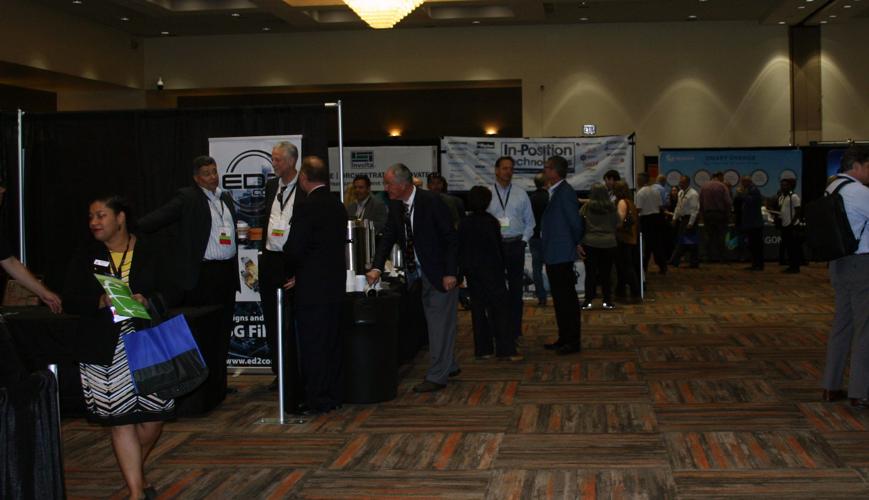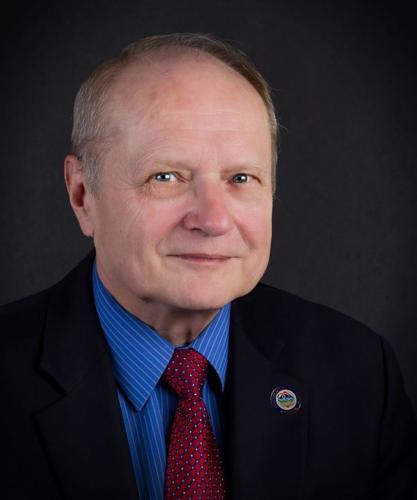While the University of Arizona has long been a major economic engine for the Tucson area, it’s poised to help drive the local tech startup community like never before.
That was evidenced by recent events like last week’s Southern Arizona Tech + Business Expo and the TenWest Impact Festival in mid-October.
After co-sponsoring TenWest, a 10-day festival in October organized by Startup Tucson, the UA sponsored and had its own expo area at the Tech + Business Expo, showcasing research under way in more than 20 colleges and departments.
And by January, Startup Tucson will move into the UA’s nascent Arizona Forge, a business incubator focused on digital health-care solutions and sustainability, at Roy Place as part of a new partnership to form a downtown “business innovation hub.”
It’s not surprising that the UA is deeply involved in Tucson’s startup ecosystem, Stephen Fleming, UA vice president of strategic business initiatives, told a crowd of attendees at the Tech + Business Expo at the Tucson Convention Center on Wednesday.
“Every innovation hub in North America is centered around a great research university,” Fleming said, citing the UA’s status as a top-tier research school with more than $600 million in research spending.
The UA also has strengthened its ties to the local entrepreneurial ecosystem through Tech Launch Arizona, its tech commercialization arm, the UA Center for Innovation and the McGuire Center for Entrepreneurship, which helped support the IdeaFunding entrepreneurship training and business-pitch contest as part of TenWest.
For its efforts, the UA was honored at the event with the Technology Council’s Member Organization of the Year award. The school was lauded for its new strategic plan focusing on an “outward-facing, community approach” and greater access to technologies on campus.
Strategy1, a Tucson business consultancy, was awarded the Tech Council’s Distinguished Service honor for its work with the statewide optics industry.
Earlier this year, Strategy1 was awarded a small-business administration contract worth $500,000 to work with a statewide optics industry group to help existing optics firms grow, promote the formation of new optics companies and boost the visibility of the $3 billion statewide industry.
The strength of the UA’s top-rated James C. Wyant College of Optical Sciences was highlighted at the tech expo during a keynote speech by the college’s namesake.
James Wyant, UA professor emeritus of optics and founding dean of the college, recounted how pioneering astronomer and optical scientist Aden Meinel founded the Kitt Peak Observatory near Tucson in 1958 and founded the optical sciences program in 1964 to address a growing need for such research partly for national security.
In 1967, construction began on the first Optical Sciences Center building on the UA campus — funded indirectly by the CIA, it later came out — and today the college is the largest undergraduate and graduate optics program in the nation, with about $40 million in annual research spending, Wyant said.
Advances in optics including laser technology developed in the early 1960s — including breakthroughs by UA grads — have helped drive the digital revolution with advances in computer chipmaking and fiber optics, and today optics technology is used extensively in everyday devices such as computers and cell phones, Wyant said.
Optics’ role will only grow as it underpins advances in renewable energy, communications, manufacturing, health care and sensors used for things like self-driving cars and facial-recognition technology, he said.
“Optics has gotten into everything, and it’s going to grow like crazy,” Wyant said.
While the UA remains a leader in optics research and a key economic driver in that arena, Wyant said, other university communities are prioritizing optics and nations in Europe and Asia — especially China —are investing heavily in optics research.
“While I think the future in optics is fantastic, the competition is going to be fantastic and we’re going to have to work hard and invest a lot to make sure we get our share of the business,” Wyant concluded.
Honoring tech leaders
Wyant was among the Tucson-area technology leaders honored Oct. 24 at the Governor’s Celebration of Innovation Awards, co-sponsored by the Arizona Commerce Authority.
He was awarded the AccountabilIT Lifetime Achievement Award for his many contributions to the Arizona science and technology communities.
“During his career at the University of Arizona, he’s been instrumental in furthering education, research and philanthropy, both within the realm of optics and within technology as a whole,” Tech Council President and CEO Steve Zylstra said of Wyant.
A UA spinoff, Tucson-based FreeFall Aerospace Inc., also was recognized at a state tech awards event with the Innovator of the Year — Start-Up Company honor.
Founded by UA astronomy professor Chris Walker and NASA veteran Doug Stetson, the company has used technology licensed from the UA to develop a new kind of high-efficiency and steerable spherical antenna for small satellites.
Other Tucson-area awardees at the Governor’s Celebration of Innovation Awards:
- As previously announced in September, Tucson businessman and investor Fletcher McCusker was named the 2019 Ed Denison Business Leader of the Year. McCusker has been deeply involved in tech startups and in 2017 co-founded a venture-capital fund dedicated to UA startups.
- Louise Hecker, UA associate professor of medicine whose research focuses on regenerative biology and mechanisms of tissue injury-repair, received the Benchmark Academia award.
- Emily Ignatoff, a student at Tanque Verde High School, received a Future Innovator award, and Matthew Fosdick of Empire High School won honorable mention in that category.







